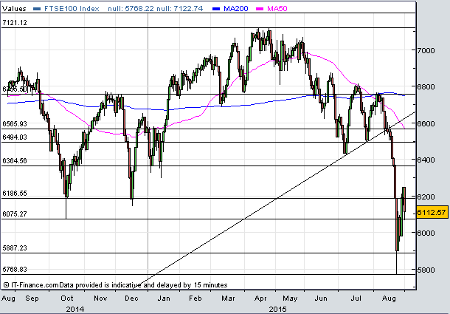Greece - what's the damage?
6th July 2015 11:42
by Lee Wild from interactive investor
Share on
Everyone knew the outcome of Sunday's Greek referendum was impossible to call, and the implications for each option were understood by all. A "no" vote against Europe's latest (and off-the-table) bailout deal would cause carnage on local equity markets, while a "yes" vote - essentially a vote in favour of euro membership - would trigger share gains. Well, an initial 79-point loss in London has narrowed to less than 30, and there is certainly no panic in the City. But is this really it?
Of course not. After 61% of Greek voters said "no" to Europe, a frustrated Chancellor Merkel and President Hollande will decide next moves in a meeting in Paris today. It will be the first of many meetings in the coming days and weeks, and decision made now will determine the outcome of this Greek tragedy.
Leader Alexis Tsipras claims "greater negotiating strength" following a mandate from the Greek people. European lenders, meanwhile, will be reluctant to back down from the tough stance adopted in the run up to Sunday's vote. Doing so would not only make them a laughing stock, but also seriously weaken their authority and credibility in future negotiations, not just with Greece, but with others who may have got ideas - stand up Portugal and Spain.
That does not mean a deal cannot be done - some limited form of debt relief would certainly act as an olive branch - but neither side will want to lose face. It is the hope of a compromise, and the departure of Greek finance minister Yanis Varoufakis - a serious obstacle to any agreement - which has limited the damage to share prices Monday.

A Greek exit does, however, appear more likely now than on Friday. The ceiling on Emergency Liquidity Assistance (ELA) to Greek banks is unlikely to be increased by the European Central Bank (ECB) from the current €89 billion. That could mean Greek banks have to reduce cash withdrawals from the current €60 a day - cue TV footage of banks closing doors to angry savers. A €3.5 billion bond repayment is due on 20 July, too.
Hints as to the potential outcome of talks will, inevitably, drive equity markets. "Over the next 24-36 hours however it's likely that we stay in wait-and-see mode with the European response function most important right now," says Deutsche Bank strategist Jim Reid. "The latter part of the week could see bigger market moves one way or the other once we know where we stand on negotiations."
Nigel Green, founder and chief executive of deVere Group, last week warned that Greece could "become another Argentina". There's a good chance investors will shift into perceived safe havens such as gilts and US treasuries in coming days, says Green, sparking a stockmarket sell-off.
"With negotiations potentially taking an extended period of time, the uncertainty is likely to be protracted, meaning the sell-off and buying opportunity could also last some time - unlike last week when markets bounced back quickly."
It was the banks - , , and - that took much of the stick Monday. Miners struggled, too, and another profits warning from has provided the icing on the cake.
In a nutshell, markets are unlikely to react violently until we get a clearer picture of whether a face-saving deal is achievable. Deutsche's Greek expert George Saravelos puts the risk of "Grexit" at less than 50%. Societe General believes the probability rises to 65%. Truth is, no one really knows. It's a best guess. What is clear, however, is that investors are caught between not wanting to be out of the market, but not wanting to be around if/when Greece goes under.
This article is for information and discussion purposes only and does not form a recommendation to invest or otherwise. The value of an investment may fall. The investments referred to in this article may not be suitable for all investors, and if in doubt, an investor should seek advice from a qualified investment adviser.